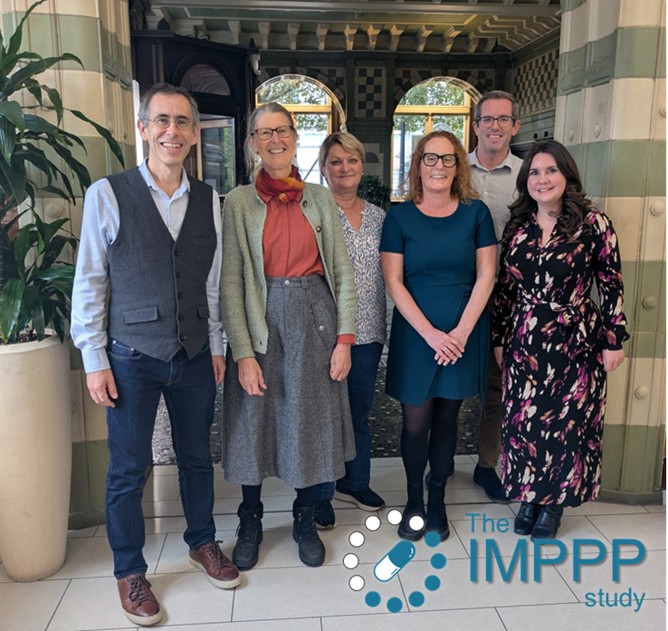Exeter Collaboration for Academic Primary Care (APEx) Blog
Exeter Collaboration for Academic Primary Care (APEx) Blog
Posted by ma403
28 October 2025
A few members of the team following the IMPPP dissemination event at RCGP in October 2025
The research process can be a long one. Back in 2016, NIHR
put a call out for evidence for interventions to improve the management of
polypharmacy. By early in 2018, we had been awarded just under £2 million by
HSDR to develop, optimise and evaluate a primary care-based complex medication
review intervention for people with polypharmacy.
We undertook initial intervention development work with
colleagues in Scotland, who had already conducted some important research
tackling potentially inappropriate prescribing in general practice. There was
already a national polypharmacy programme north of the border, which precluded
undertaking a definitive trial, but in England practice-based pharmacists were
only just emerging on the scene, and there was no coherent system to help cope
with growing levels of prescribing. So we spoke to Scottish clinicians and
patients, to better understand what worked and didn’t work, and looked at some
of the provisional numbers coming out of their established programmes. Our
discussions helped shape an intervention which included a clear structured
process for medication review, with an emphasis on patient-centred care, plus
dedicated time for collaborative working between GPs and pharmacists.
Additional bells and whistles were included: a clinician training programme,
practice performance feedback, financial incentives, and a bespoke IT tool.
Despite some (perhaps inevitable) delays in software development, by mid-2019
the IMPPP intervention was ready to be tested.
The best laid plans…
Our grand plan was to undertake a randomised pilot in five
practices, comparing intervention and “usual care”, before moving to a full
trial. Clinical trials are difficult beasts – there are huge numbers of moving
parts, and careful planning and risk mitigation strategies are required to make
sure things go to plan. I had never led a trial of this size, but I had a great
team and some really experienced people helping me. The only slight oversight
was our failure to foresee a certain coronavirus in central China jumping from
its usual animal reservoir into humans. About one week after we sent out
invitations to potential participants in early 2020, the Covid pandemic
resulted in a national lockdown. Some choice words resulted – although given we
couldn’t meet anyone in person, these generally were conveyed over
newly-discovered video conference calls. We weren’t even allowed in the office
to tell any enthusiastic prospective participants that there might be a slight
delay…
Months later, as some strange degree of normality started to
return to the world, we pressed on. Tweaks were made to deal with the increase
in remote consulting, to fix an IT tool that had never been designed to be used
by people working from home, and to try to accommodate practices swamped by the
demands of the massive national Covid vaccination scheme. Although compromises
were made, we got some useful data from the pilot to help us optimise the
intervention, and over a 6-month period in 2022, we recruited over 1700 patients
from 37 GP practices into the main trial. Clinicians engaged well with the
intervention, with around 90% of reviews delivered as expected, and other
elements, such as the training, performance feedback and even the
somewhat-clunky IT system, were positively received.
Drum roll please…
After a 6-month intervention delivery period, and 6-month
further follow-up, we had finished. Data was collated and cleaned. And the
result? There was no difference whatsoever in the primary outcome of
potentially inappropriate prescribing, between intervention and usual care
arms. You might have expected some further choice words, but all was not in
vain. There were some tantalising findings from secondary analyses, suggesting
possible reductions in inappropriate prescribing for “less ill” patients, and
slight improvements in treatment burden. And the process evaluation, which had
been really well designed by the team and conducted in parallel with the trial,
produced some very promising findings around patients’ satisfaction with their
care, and the benefits of robust interprofessional collaborative working. Definitely
a lesson in how well-planned research can yield important outcomes,
irrespective of the primary result.
Earlier this month, we presented the findings to a
fantastically engaged group of patients, clinicians and policymakers at a
dissemination event at the Royal College of GPs in London. The main clinical
effectiveness paper was published in Lancet
Health Longevity the next day, and joins papers describing patient experience and interprofessional
collaboration. It has been a very long journey to get to this point, but
it’s been an incredibly valuable one. I have learned a huge amount – about
research, myself, and life more generally – and I’ve been lucky to work with
many brilliant colleagues along the way. And the journey is almost certainly
not finished. The findings may have been negative, but they remain highly
relevant to practice and policy, so stakeholder engagement is likely to be
ongoing for some time. We’re also sitting on loads of valuable additional data
which may help us better understand the reasons for the negative results. And
the positive findings from the secondary analyses of the trial, plus the
process evaluation, point to opportunities for additional exciting research. Perhaps
something to keep me busy for the next ten years?
Rupert Payne